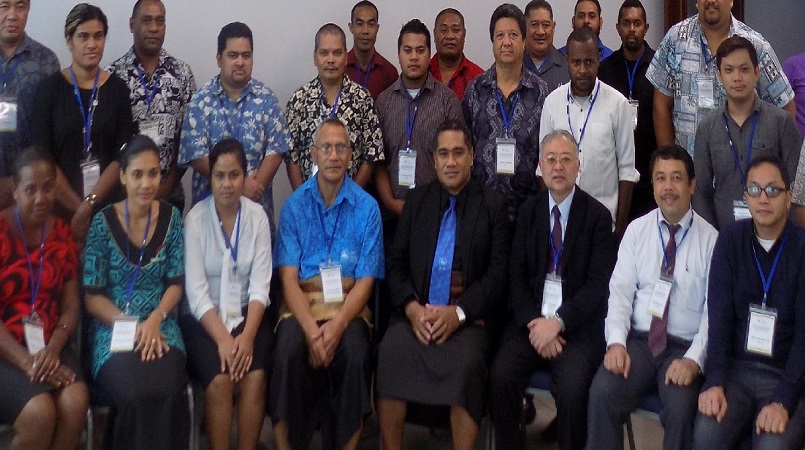
Regional participants at the week-long Joint SPC-APEC Regional Workshop on Energy Statistics and Modelling for the Sustainable Development Goals 7 and the COP 21 INDC Energy Targets were reminded this week of the importance of their roles.
The Chief Executive Officer for the Ministry of Meteorology, Energy, Information, Disaster Management, Environment, Climate Change and Communication (MEIDECC) Mr. Paula Ma’u said data is one of the key problems in any sectors in the Pacific.
“Your workshop this week is about statistics and data. As you would appreciate from your daily works, data is a major problem with any kind of planning and in any sector in the Pacific, as in the developing world for that matter,” he said while opening the workshop at the Tungi Colonnade here in Nuku’alofa.
He said access to accurate and reliable data and the ability to analyse and interpret those data for decision making and the formulation of energy policies are central to the effective participation of the PICTs in the global processes such as the Sustainable Development Goals and the Paris Agreement.
“In March 2013, a major data revolution was set in motion in the energy sector of the Pacific through the Pacific Regional Data Repository (PRDR),” he said.
“The Tongan government continues to support the PRDR as we have in previous years.”
Mr. Ma’u stated that PRDR was a project document supported by a Declaration signed by Pacific Leaders in New York in September 2013, which was followed by the PRDR portal launched in Samoa in 2014.
SPC launched the PRDP portal at the Small Islands Developing States (SIDS) meeting in Samoa and in 2015 the World Bank gave financial support to the PRDR.
The World Bank’s support included developing a PRDR Strategy which will make it easier for development partners to financially support the PRDR.
Mr. Ma’u stressed that there was no point in having data and information in the PRDR if one does not know how to use it.
He highlighted two key global developments that took place last year, which were:
1. The adoption of the Sustainable Development Goals (SDGs)
The global community has adopted Goal 7 of the Sustainable Development Goals (SDGs), which focuses on sustainable energy for all and commits the UN family, including the PICTs, to work towards three associated targets:
§ universal access to affordable, reliable and modern energy services
§ increase substantially the share of RE in the global energy mix
§ double the global rate of improvement in EE
A global tracking framework has been put in place to trace the progress of every country in terms of these targets.
2. The other key global development was the Paris Agreement
The Paris Agreement calls for deep and urgent reductions in global emissions.
At the heart of these reductions are the increased use of feasible renewable energy and energy efficiency technologies, as contained in your respective Nationally Determined Contributions (or NDCs) and for which each Party is obliged to regularly report on their progress and achievements.
The workshop aims to help transfer knowledge and skills from Asian participants to Pacific counterparts to enable them to carry out statistical analysis and modelling to track progress in the region’s energy sector goals and targets, SDG Goal 7 as well as respective Nationally Determined Contributions.
The five day workshop is being jointly organised by the Pacific Community (SPC) and the Asia Pacific Energy Research Center (APEC) of the Asia-Pacific Economic Cooperation (APEC) and is supported by the World Bank through its Technical Assistance on the Pacific Regional Data Repository for Sustainable Energy for All (PRDR for SE4ALL).
